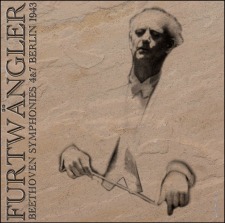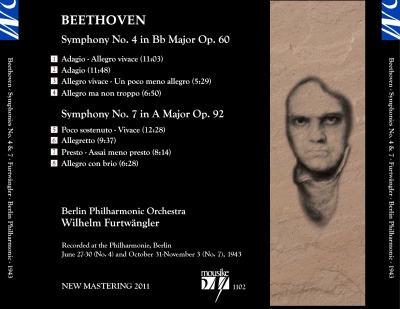 | Beethoven Symphony No. 4 in Bb Major Op. 60 Beethoven Symphony No. 7 in A Major Op. 92 Berlin Philharmonic Orchestra - 1943 $9 | ||
The 4th has marvelous sound in both its recordings, with and without an audience. The symphony performed here is no "Greek maiden" but rather a Greek play. The struggle for freedom from oppressive classical style is evident in the first movement, while the second explores as no other the necessity of flow in one's life. Henry Fogel wrote of this transfer of the 4th: "An important aspect of Chibás' transfer here is the dynamic range. Although others have tried to compensate for the dynamic compression of many of the conductor's recorded performances, particularly those from the 1940s, no one seems to have done it as successfully as Chibás."
The 5th is one of twelve Furtwängler recordings of this work. It may be the greatest, although I have a personal bias for the May 27, 1947 performance, also available here. The first movement receives a dark tragic performance. The last movement is thus appropriately glorious: an affirmation of humanity in the face of the greatest tragedy. Like the 7th, this was a difficult recording to work with. However, finally, the sound is marvelous, with a wide frequency range and wide dynamics that make this magnificent performance come alive like never before.
The 6th as interpreted by Furtwängler is unlike any other. The relationship with nature is totally different. You won't find the usual reverence and submission to nature. Here the relationship is one of participation, becoming an erotic love affair in the last movement. While the orgasm in the coda of the 5th movement may be slightly more satisfying in the Berlin 1954 performance, the fury in this one is even greater. It should be noted that the recording had a lowering of the volume and change in equalization for most of the storm. In our remaster, the correct relationship in volume and equalization of all the movements has been restored.
I always felt that beneath the terrible sound, here was the greatest 7th. Finally, I am able to enjoy it, although I must confess that it was a very difficult task. The first movement has extraordinary flexibility and expressiveness combined with strength, what Furtwängler is all about. There is no modern "allegretto" nonsense in the second movement, but rather a profound expression of the rhythm of life itself. A glorious trio complements a furious scherzo, while the last movement achieves a level of ecstasy I have never heard in any 7th in my life. A quote on this 7th from Henry Fogel: "This is an extremely successful transfer, with the orchestra sounding more like an orchestra, more musical, than any prior version."
 |